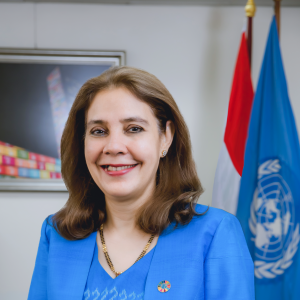Gita Sabharwal Speech at the IGCN Annual General Meeting Driving Companies to Move “Forward Faster”
-----
Prof Yuda Turana, Rector Atma Jaya Catholic University
Dr. Vivi Yulaswati, Deputy for Maritime Affairs and Natural Resources, Ministry of National Development Planning/Bappenas
Y. W. Junardy, President of IGCN
Josephine Satyono, Executive Director of IGCN
Boards of IGCN (Founders, Supervisors, Advisors, and Management)
Members and Partners of IGCN
I feel privileged to join you at this important annual event, which brings together business leaders, policymakers and the UN to accelerate the agenda of Moving Forward Faster.
It is an honour for the UN to sit on the IGCN board and I hope to bring the whole UN system to bear strategically on inclusive growth in line with your and the Government’s vision of transforming the economy.
I am new to the country, and I have heard a great deal about the impactful work of IGCN.
With a revenue of IGCN companies touching $145 billion as of earlier this year, your commitments are at scale with the platform leveraging private sector leadership to invest in cleaner technologies, increase responsible investments and invest in human capital.
Your government’s commitment to the SDGs provides much-needed impetus for the IGCN under the leadership of Pak Junardy to step up its ambition to fast-track the high-value economy.
Deepening our partnerships is critical in today’s complex geopolitical contexts, especially against a backdrop of fiscally stressed governments. This highlights the private sector’s key role in sustaining pathways for high growth and a just transition.
Indonesia’s private sector generates 9 in 10 jobs and contributes close to 80% of GDP with a large and diverse base of SMEs, which are integral to supply chains across sectors.
In my dialogue with business and government leaders, I have seen first-hand their innovative thinking and genuine commitment to sustainability.
This will enable Indonesia to fast-track its transformation into a developed country within two decades.
In my view Forward Faster will depend on three areas for acceleration:
(1) raising ambition and leadership
(2) unlocking sustainable investments
(3) championing gender equality and decent work.
Allow me to speak to these 3 themes:
First, the private sectors will need to demonstrate its leadership towards the government’s commitment to carbon neutrality by mid-century.
This will require investing in deep decarbonization through green technologies to support reductions in emissions, which account for nearly a quarter of carbon emissions.
This is a complex process that involves adopting sustainable practices and implementing circular economies to improve efficiency and resource use.
It must be country-led and country-owned in order for solutions to be tailored to local contexts.
Encouragingly, we are seeing increasing demand from industrial parks nationwide to align with international standards.
For example, in Aceh, South Sumatra, East and West Java provinces, the UN, in partnership with the private sector, is introducing enhanced oil recovery technology in fertiliser factories. This reduces emissions by 15% and cuts production costs by $47million.
Similar ambition is being expanded to the iron and steel sectors by introducing electric arc furnaces, which reduces energy consumption.
Importantly, the private sector has been quick to scale up these technologies at their own cost because they positively impact bottom lines while reducing carbon footprints.
This transformation needs to extend to all sectors of the economy.
Second, unlocking sustainable investments will be critical to take the green transition to scale.
This will demand long-term domestic financing premised on broad-based partnerships among government, private sectors and financial markets.
The Government and private sector is forward-leaning in leveraging the maturity of the bond market, which witnessed the issuance of nearly $62 billion last year.
This generates new investments for sustainable businesses.
This is a big advantage as it will expand the ecosystem for renewables, infrastructure and downstream industries.
Similarly, banks are increasing adopting sustainable financial frameworks and plans to scale up the ESG portfolio.
The UN partners with five banks with an asset base of $116 billion, with under a quarter of this directed towards ESG. Rises in the share of the ESG portfolio will translate into increased financing for the private sector to reduce its emissions.
Third, championing gender equality and decent work serves as the bedrock for a just and sustainable transformation.
In 2021 there were only eight women CEOs in the top 200 publicly listed companies and with nearly half of them having no female executives in leadership roles in Indonesia.
There has been progress since then.
I am heartened that CEOs are discussing gender equality alongside issues of sustainability, inclusion and net zero growth. This shows how important it is to get gender equality right for bottom lines!
For example, the decision by one of the world’s biggest investment banks not to take a company public unless it has a woman board member demonstrates that good investment sense. This is because more diverse companies consistently have higher profit margins.
Business leaders like you can take gender equality to the next level by making it part of your economic DNA!
This will boost the representation of women in the labour market, close the wage gap and reduce women’s predominance in the informal economy in a win-win for everyone involved.
In closing, let me stress that IGCN embodies the power of partnerships.
This partnership between the private sector, government and the UN has the potential to be transformational, positioning IGCN as an inspiration for other country-level networks across the region.
Thank you.
Speech by


